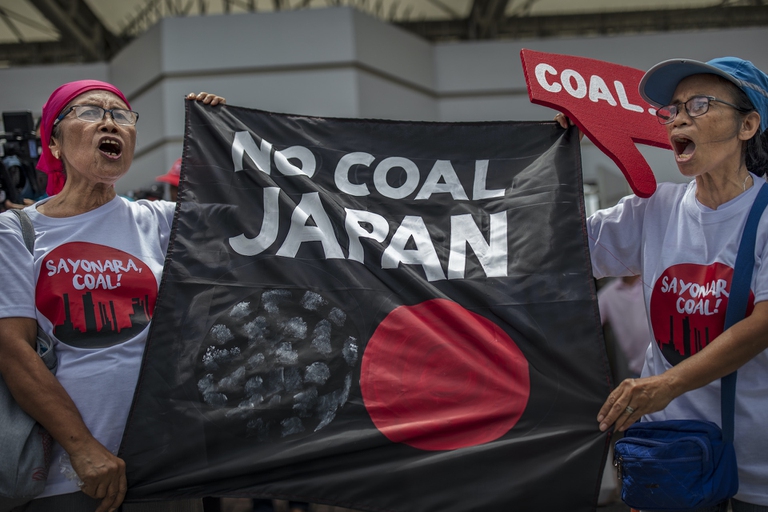https://www.lifegate.it/kobe-giappone-carbone
- |
- Japan has started the expansion of new coal-fired power plants.In Kobe, a citizens' committee has been fighting against these projects for several years.
- Their complaint was rejected by the first level of judgement, but the committee appealed.
- Japan is targeting ammonia co-firing as a strategy to clean up its coal plants.A very questionable technology.
Kobe is a city of about 1.5 million people in central Japan, which has developed as one of the country's major ports.Kobe Steel, one of Japan's largest steel producers, has been a major driver of the city's development.The company not only produces steel but also energy through four coal-fired power plants, in Kobe through its subsidiary Kobelco, and two gas-fired power plants in Tochigi Prefecture.
A development, as often happens, occurred at the expense of citizens' health.The expansion of the Kobe coal plant came with the recent construction – in February 2023, to be precise – of units 3 and 4, located in a former blast furnace in the city, both located just 400 meters away from residential areas.Civil society and residents of the surrounding area formed a committee, No coal Kobe, which has been fighting against the expansion of the power plant since 2017.But the government and courts are against it.

Kobe residents challenge Kobelco in court
Many people in Kobe city suffer from respiratory diseases such as chronic bronchitis, asthmatic bronchitis and emphysema.Kobelco emits enormous quantities of CO2 and pollutants:the four units together emit approximately 13 million tonnes of CO2 per year and also large quantities of nitrogen oxides, sulfur oxides and fine particulate matter.In short, Kobelco is the largest fixed source of CO2 and pollution atmosphere of the city of Kobe.
The voices of residents opposing the construction of coal-fired power plants are growing louder as i climate changes they become more serious every day.In 2017, the No coal Kobe committee presented a petition calling for the suspension of the construction of the new units and the initiation of discussions with Kobelco.Despite this, expansion works on the power plant began in 2018 the citizens then filed a lawsuit against Kobelco, Kobelco Power Kobe No.2 (a subsidiary for units 3 and 4) and Kansai electric power company (Japan's second largest utility company).
In the lawsuit, residents argue that climate change and air pollution caused by the plant's massive amount of long-term CO2 emissions violate their personal rights, including the right to a healthy life.On March 20, 2023, a ruling was issued rejecting the appellants' requests.On April 1, 2023, thirty-four plaintiffs appealed and the case is still being heard by the Japanese Court of Appeals.
The Japanese government and banks promote the construction of new coal-fired power plants
For many years, Japan has focused on coal energy as a source of energy and banks have supported companies to build or modernize coal-fired power plants to replace nuclear power plants, especially after the tsunami that hit Fukushima in 2011.But in doing so, the Japanese government is failing to meet its commitments to reduce CO2 emissions, which in 2022 he spread its road map to achieving climate neutrality by 2050.
Commercial banks such as Mizuho, Smbc (Sumitomo Mitsui Banking Corporation, the second largest private bank in the country) and Mufg (Mitsubishi Ufj Financial Group) play a crucial role in supporting the construction of coal-fired power plants.Despite opposition from Kobe citizens, the three banks together extended more than $1.5 billion in loans for Units 3 and 4 in 2018.After the loan was made, all three institutions implemented policies to exclude financing for new or expanded coal plants between 2022 and 2023.However, these policies were not applied to previous financing, such as that provided to Units 3 and 4 of the Kobe power plant, even though these only began operating commercially in 2022 and 2023.
Japan offers false solutions to the climate crisis
The disappointing decisions by the courts and the three banks' support for coal demonstrate a lack of sense of urgency of Japan when it comes to climate change and its effects on people.Encouraged by government and banks, fossil fuel companies continue to do so business as usual, even relying on false solutions.The Kobelco decarbonization plan, for example, It is based on the co-combustion of ammonia of its coal-fired power plants, to reduce CO2 emissions.The fossil fuel industry in Japan is focusing heavily on this technology to clean up coal plants:on April 1, 2024, Jera (Japan's main energy player) he started the first commercial-scale test of co-firing a mix of coal with 20 percent gray ammonia (produced from methane).If the results are satisfactory, Jera aims to validate the coal-ammonia co-combustion technology within a year, in March 2025.
But here's the problem:for the large-scale start of the use of ammonia at other coal-fired power plants we will have to wait until 2027-2028.And although Jera's initiative is supported by the state research center Nedo (and thus fits into Japan's transition plans for the decarbonisation of the energy sector), co-firing of coal and ammonia is not yet documented on a large scale, while there are much more valid alternatives to focus on.Like them renewable energy.Not to mention that different relationships have highlighted that the introduction of ammonia co-combustion has little effect on reducing CO2 emissions.
The measures adopted by Japan to fight climate change and the policies of its major banks they are therefore highly inadequate and continued support for coal plants will only do that further accelerate the climate crisis.Knowing the history of the No Coal Kobe committee serves first of all to let people know that someone is fighting for things to change.Now who knows if the Japanese court of appeal, called to rule on the complaint presented by the committee, will be influenced by the recent ruling in which the ECHR he condemned Switzerland for climate inaction.These are two orders of judgment that are distant from each other, it is true, not only geographically but also in terms of law, but we know that hope is the last to die.
